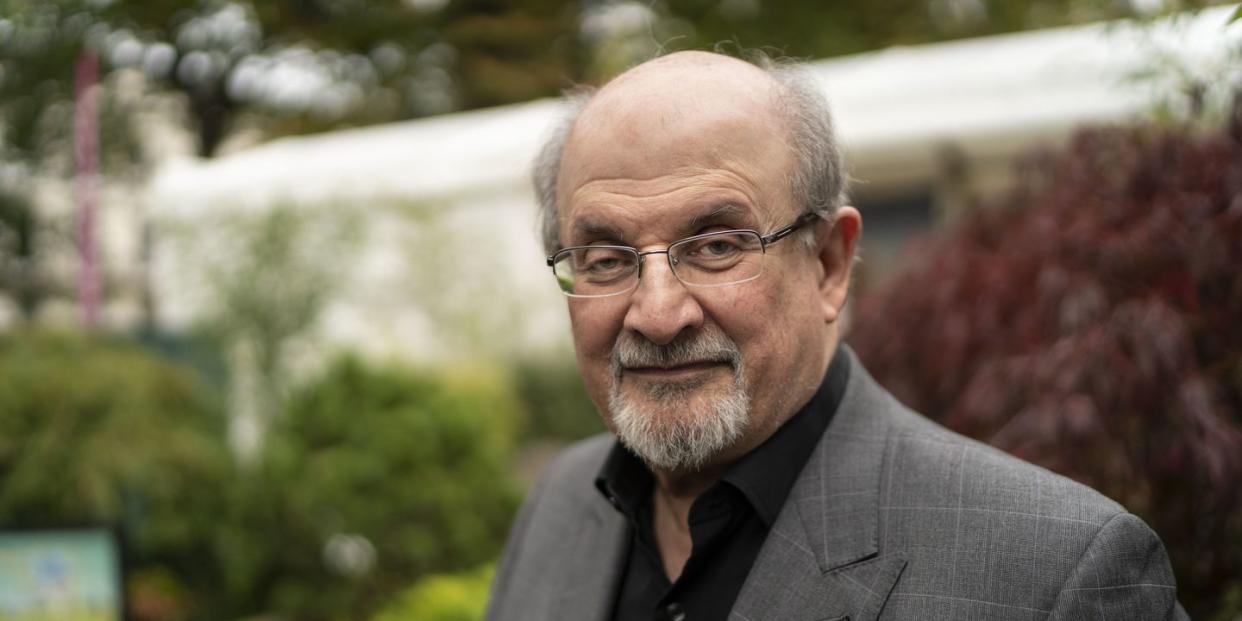Salman Rushdie Remains in Critical Condition Following Attack

- Oops!Something went wrong.Please try again later.
- Oops!Something went wrong.Please try again later.
"Hearst Magazines and Yahoo may earn commission or revenue on some items through the links below."
On Friday, author Salman Rushdie was about to speak at the Chautauqua Institution in Western New York. He was set to give a talk on how the U.S. has been a safe haven for exiled writers, but before he could begin, a knife-wielding man stormed the stage and started stabbing Rushdie in the abdomen and the neck.
The assailant, who was later identified by New York State Police as 24-year-old Hadi Matar of New Jersey, was arrested after onlookers wrestled him to the ground.
"It took like five men to pull him away and he was still stabbing," lecture attendee Linda Abrams recounted to the New York Times. "He was just furious, furious. Like intensely strong and just fast."
Matar's motives for the stabbing remain unclear, but the attack could be related to a fatwa or edict issued over three decades ago that instructed Muslims to kill Rushdie. In 1989, Iran's supreme leader Ayatollah Khomeini issued the fatwa following the publication of Rushdie's novel The Satanic Verses, which depicts the Prophet Muhammad in a way that some Muslims deemed offensive and blasphemous.
In the fatwa, which was broadcast on the Iranian radio, Khomeini said, "I am informing all brave Muslims of the world that the author of The Satanic Verses, a text written, edited, and published against Islam, the Prophet of Islam, and the Qur'an, along with all the editors and publishers aware of its contents, are condemned to death. I call on all valiant Muslims wherever they may be in the world to kill them without delay, so that no one will dare insult the sacred beliefs of Muslims henceforth."
For the next decade, Rushdie lived in hiding under police protection. In recent years, however, Rushdie has reemerged in public life without security, saying, "I have to live my life."
Authorities have not indicated if the stabbing of Rushdie was explicitly related to the Iranian fatwa. Iranian authorities have denied any connection, but blamed the author himself: "Regarding the attack on Salman Rushdie, we do not consider anyone other than [Rushdie] and his supporters worth of blame and even condemnation," the Iranian Foreign Ministry spokesperson Nasser Kanaani said in a news conference.
After the attack, Rushdie was rushed to the hospital in Erie, Pennsylvania and put on a ventilator.
"Though his life-changing injuries are severe, his usual feisty and defiant sense of humor remains intact," his son, Zafar Rushdie, said in a statement posted to social media yesterday. "We are so grateful to all the audience members who bravely leapt to his defense and administered first aid, along with the police and doctors who have cared for him and for the outpouring of love and support from around the world."
In another statement, Rushdie's agent Andrew Wylie told the New York Times. "The road to recovery has begun. It will be long; the injuries are severe, but his condition is headed in the right direction." Earlier, Wylie shared that Rushdie will likely lose an eye, "the nerves in his arm were severed; and his liver was stabbed and damaged."
We will update this story as more information becomes available.
You Might Also Like

